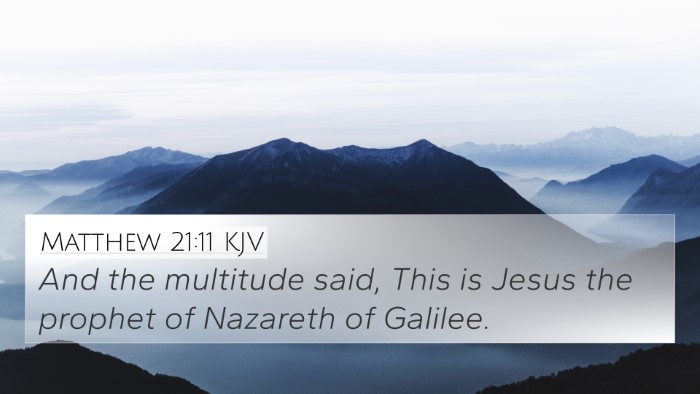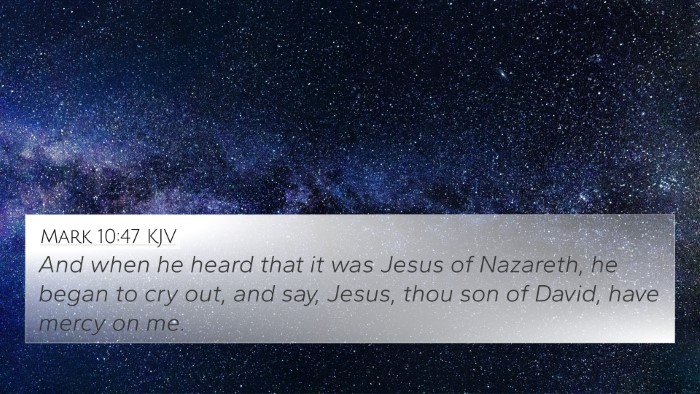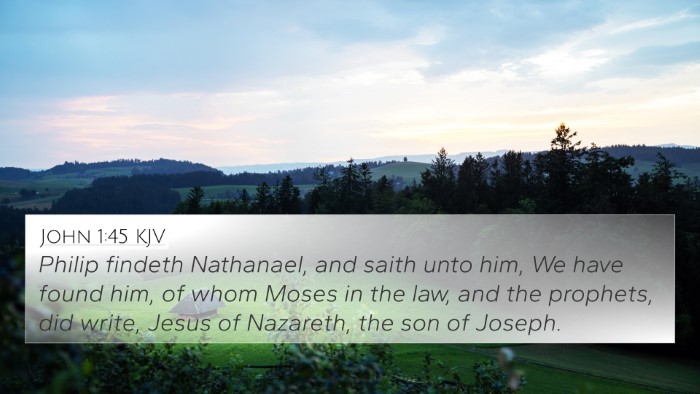Meaning and Interpretation of Mark 14:67
Mark 14:67 captures a pivotal moment in the passion narrative, presenting the scene of Peter's denial of Jesus. This verse reads:
"And when she saw Peter warming himself, she looked upon him, and said, Thou also wast with Jesus of Nazareth." (Mark 14:67, KJV)
Contextual Background
To understand Mark 14:67, it's essential to consider the immediate context of the events leading to Jesus' arrest and crucifixion. This verse highlights the tension Peter experiences as he struggles with fear and loyalty.
Summarized Insights from Public Domain Commentaries
Here, we combine insights from the commentaries of Matthew Henry, Albert Barnes, and Adam Clarke to elucidate the meaning of this verse.
Matthew Henry's Commentary
Matthew Henry emphasizes Peter's human frailty at this crucial moment. Despite his earlier bold proclamations of loyalty, Peter finds himself in a situation where he is confronted and challenged about his association with Jesus. Henry notes that this confrontation serves as a reminder of the challenges believers face in a hostile environment.
Albert Barnes' Commentary
Albert Barnes provides additional context by framing this event as part of the fulfillment of prophecy regarding Peter's denial. He highlights that the verse illustrates how easily a disciple can falter under pressure. Barnes emphasizes the significance of the servant girl’s recognition of Peter, which underscores the irony that a simple question brings forth a dramatic denial of faith by someone who had been a close follower of Christ.
Adam Clarke's Commentary
Adam Clarke explores the psychological aspect of Peter's denial, discussing the emotions of fear and shame that lead to his cowardice. Clarke also remarks on the importance of standing firm in one’s faith despite societal pressures and personal risk. He notes that this denial serves as a cautionary tale for all believers about the need for vigilance in faithfulness.
Thematic Connections
This verse draws several thematic connections within the Scriptures, providing fertile ground for cross-referencing and deeper understanding.
Related Bible Cross References
- Matthew 26:69-75: The parallel account of Peter's denial, providing further details.
- Luke 22:54-62: A fuller account of Peter's three denials and his bitter weeping.
- John 18:15-27: Another perspective on Peter's denial and its implications.
- Mark 14:30: Jesus' prediction of Peter's denial, highlighting the prophetic aspect.
- John 13:38: Jesus foretelling Peter’s denial, echoing the themes of loyalty and betrayal.
- 1 Peter 5:8: An admonition about vigilance, recalling Peter's weakness during the trial.
- Proverbs 29:25: The fear of man brings a snare, paralleling Peter’s fear in this circumstance.
- Romans 7:19: The struggle of doing what is right versus what is wrong, reflecting Peter’s internal conflict.
- Galatians 2:11-14: A discussion of Peter's behavior under pressure in a later context.
- James 1:12: Blessed is the man who endures temptation, which relates to the trials faced by believers.
Understanding the Denial
The denial of Peter is not just a historical event; it serves as a symbol of the broader human struggle against fear and self-preservation in the face of faith. Mark 14:67 prompts readers to reflect on the nature of discipleship and the challenges faced when one’s faith is tested. Each of the cross-referenced verses contributes to a deeper understanding of the themes of loyalty, fear, and redemption that permeate the Scriptures.
Conclusion
Mark 14:67, through its vivid narrative of Peter's denial, invites serious introspection regarding faithfulness to Christ amid trials. By consulting the surrounding texts and the commentaries of biblical scholars, one can gain a holistic view of the implications of this moment. The connection of this verse to other scriptures enriches the reader's understanding and emphasizes the importance of steadfastness in faith, urging those who study the Bible to consider how these themes resonate with their own lives.
In conclusion, utilizing tools for Bible cross-referencing, such as a Bible concordance or cross-reference guide, can enhance personal study and deepen one’s understanding of how scripture interrelates.










